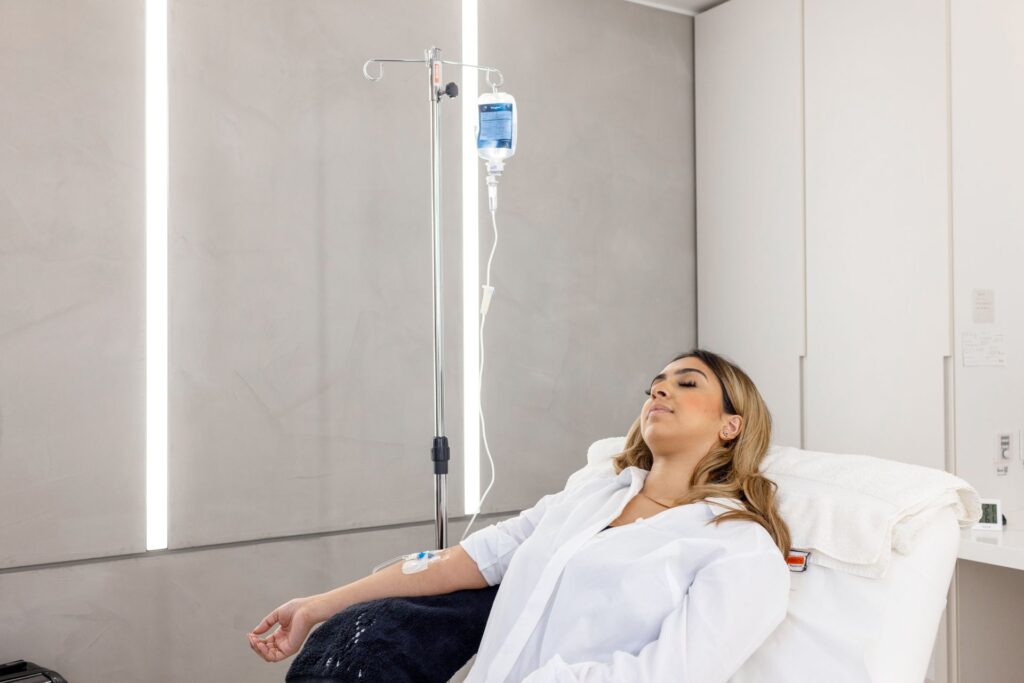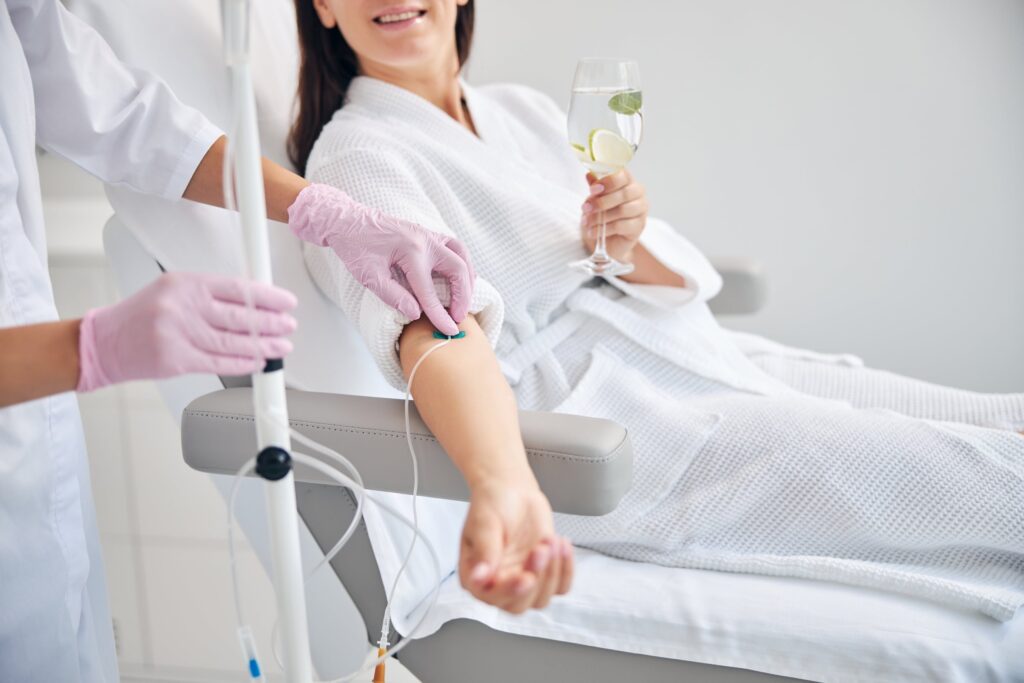From claims of “boosting” the immune system and alleviating hangovers to supporting weight loss and reducing the signs of aging, the purported benefits of intravenous (IV) therapy are as numerous as the vitamin and mineral cocktails available. While anecdotal evidence supports the potential benefits of IV hydration and vitamin therapy, scientific research is lacking.
Read on to learn about both elective IV therapies and those used in hospital settings, as well as potential benefits, side effects, risks and associated costs.

What Is IV Therapy?
IV therapy is a method of administering fluids, medications or vitamins directly into a patient’s bloodstream intravenously to address a variety of medical conditions, including nutritional deficits.
”The goal of [IV] treatment [in a hospital setting] is to replenish substances that the body has become deficient in due to underlying medical conditions,” explains Eileen O’Sullivan, M.D., an emergency medicine specialist in Portland, Oregon. “Certain medications require IV administration if they’re needed very quickly or cannot be administered or absorbed by the body via another route,” she adds. For example, if an individual can’t take their medications orally due to vomiting or if they need an urgent dose of antibiotics due to a severe infection or sepsis, they would need IV therapy.
Medically necessary IV treatments are traditionally administered in hospitals or infusion centers, which are outpatient, non-hospital facilities that are qualified for provider-administered medication infusions. In recent years, however, independent boutiques and community providers offering elective IV hydration and vitamin therapies are becoming increasingly popular. Despite this rising popularity, there’s insufficient scientific evidence to substantiate the purported benefits of non-medical IV therapy, says Dr. O’Sullivan. However, the risks are clearly understood, she adds.
When it comes to IV therapies administered for non-traditional purposes outside of a hospital setting, marketing typically focuses on “wellness,” which can be a vague term, notes Dr. O’Sullivan.
This loose categorization may also account for the scarcity of high-quality research: “Wellness” is difficult to test and measure and is, to some extent, subjective. “If a person is fatigued, there’s [no diagnosis or treatment] in the hospital that says, ‘You’re fatigued—here’s an IV bag,’” says Mordeána Williams, a doctor of nursing practice and owner of VitaMineral IV Therapy Drip Center in New York City.
Dr. Williams says she works with many patients who experience fatigue or brain fog or feel generally run down. “They tell me how they’re feeling, I ask them if they have bloodwork, [and] if they don’t, I do a full history and physical, and then I decide—based on what they’re experiencing—what vitamins to recommend [via IV therapy].”

What Is IV Vitamin Therapy?
IV vitamin therapy introduces vitamins into the body intravenously to address a deficiency or physical condition. Disorders that may necessitate an IV vitamin treatment include pernicious anemia, diarrhea and malabsorption issues caused by damage to the intestines. An IV treatment is also often utilized after surgery, following acute kidney injury or when a patient has suffered major burns.
The dosage in an IV treatment contains a higher concentration than what might be found in an oral vitamin supplement. Plus, vitamins introduced into the body through an IV may be absorbed more efficiently than those ingested orally.
“The aim is to achieve a balance,” notes Dr. O’Sullivan. “The body is designed to function with vitamin levels [within] a specific range; medical conditions can result when there’s excess or deficiency.” Similar to IV hydration therapy, the goal of IV vitamin therapy in a medical setting is to correct these imbalances and prevent problems that could result should the deficiency go unaddressed.
Potential Benefits of IV Vitamin Therapy
If you perform a web search for a nearby IV vitamin therapy provider, you’re likely to come across offerings like “Immunity Drip,” “Beauty Booster” or “Jetlag Bag”—cocktails of vitamins and minerals formulated to address a vast array of concerns, including fatigue, brain fog and chronic pain. However, even if an IV vitamin supercharge may intuitively seem beneficial, there’s little scientific evidence to support the proposed benefits of high-dose IV vitamin infusions.
“While the notion of high vitamin and hydration levels may sound appealing, the boring truth is that the body has tightly regulated mechanisms that keep our fluid status and vitamin levels in a specific range,” explains Dr. O’Sullivan.
IV vitamin therapy is an effective and efficient way to correct deficiencies and counteract the negative effects of certain medical conditions that cause vitamin imbalances; however, there’s insufficient research and evidence to support claims that vitamin therapy provides great benefits to someone with normal vitamin levels, she reiterates.
Certain vitamin deficiencies are prevalent among certain populations in the U.S., but these rates can vary significantly based on demographics. For instance, while about 25% of the U.S. population may have inadequate vitamin D levels, these insufficiencies are much more common among individuals with darker skin, as well as older adults, according to the National Institutes of Health Office of Dietary Supplements[2].
When Dr. Williams opened her IV drip center during the height of the COVID-19 pandemic, she encountered many patients who were surprised to learn about their own vitamin deficiencies.
“I started [the center during] COVID because I realized so many people got sick because they thought they were healthy.” For instance, vitamin D plays an important role in regulating appropriate immune responses in your body, and a deficiency can make an individual more vulnerable to infections. In fact, a recent review in Antioxidants concludes a deficiency in vitamin D3 may increase COVID-19 infection risk, as well as the severity of the illness[3].
While research indicates that vitamin D deficiencies can be adequately addressed with appropriate oral supplementation, Dr. Williams promotes IV vitamin infusion because of its immediate bioavailability. “It goes into your vein—you’re not losing anything in your gut,” she explains.

IV therapy is a common practice in hospital settings and independent clinics, but complications can occur, including infection at the insertion site or “fluid creep” or “volume overload,” in which excess fluid in the bloodstream can spill out into the lungs or other tissues, causing dangerous complications, such as pulmonary edema or even cardiac failure.
In the case of IV vitamin therapy, once adequate vitamin levels are reached, the body typically removes excess vitamins via urination, explains Dr. O’Sullivan. However, excess of certain vitamins, such as fat-soluble vitamins A, D, E and K, can result in harmful toxicity to internal organs, she warns.
To mitigate these risks, it’s important that a trained medical professional oversee the administration of IV therapies. However, not all clinics have the same level of oversight because regulation guidelines for infusion therapies vary state by state.
In recent years, marketing claims by some IV therapy bars made unsupported claims that their IV vitamin infusions could treat serious diseases. In 2018, the Federal Trade Commission (FTC) charged one seller with making deceptive promises about their IV cocktails’ abilities to treat cancer, congestive heart failure and multiple sclerosis[4]. More recently, the FTC sent warning letters to another IV therapy center for making unsubstantiated claims regarding its product’s ability to treat COVID-19 effectively


